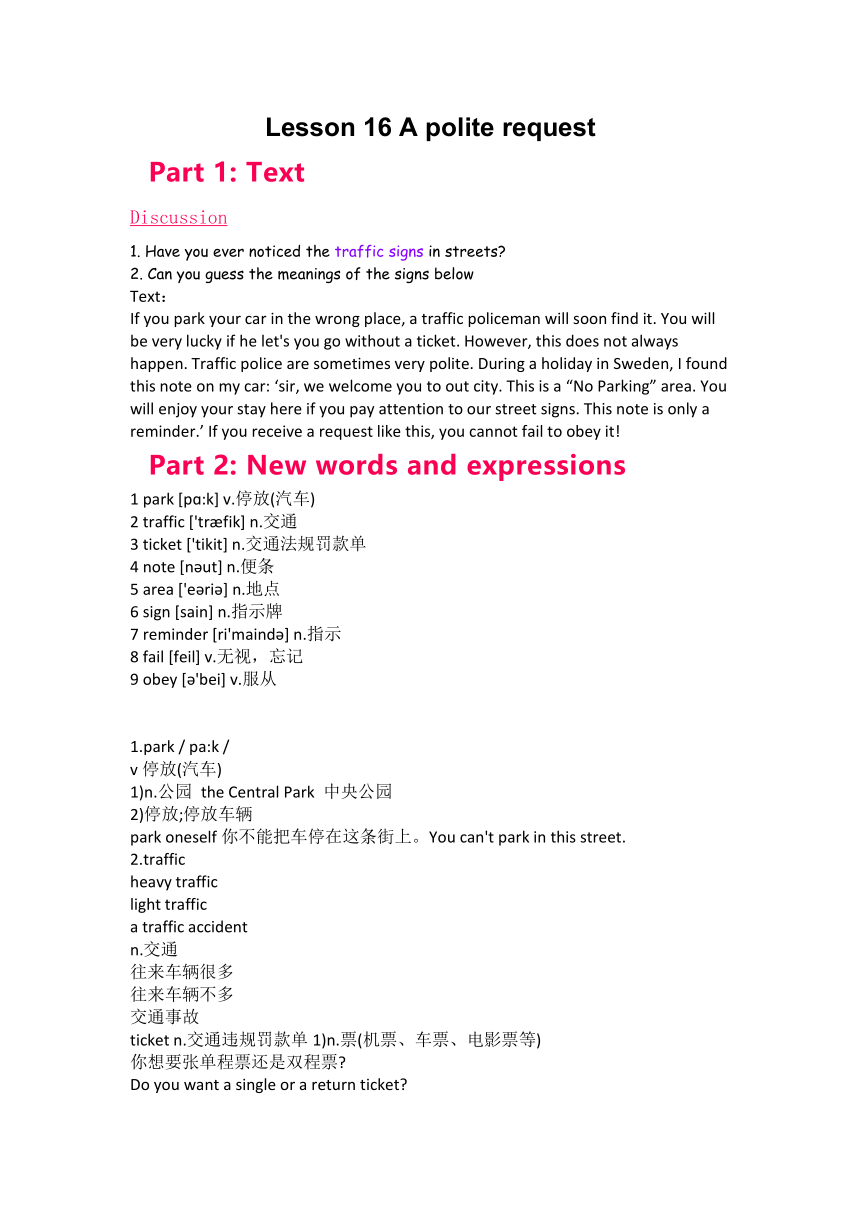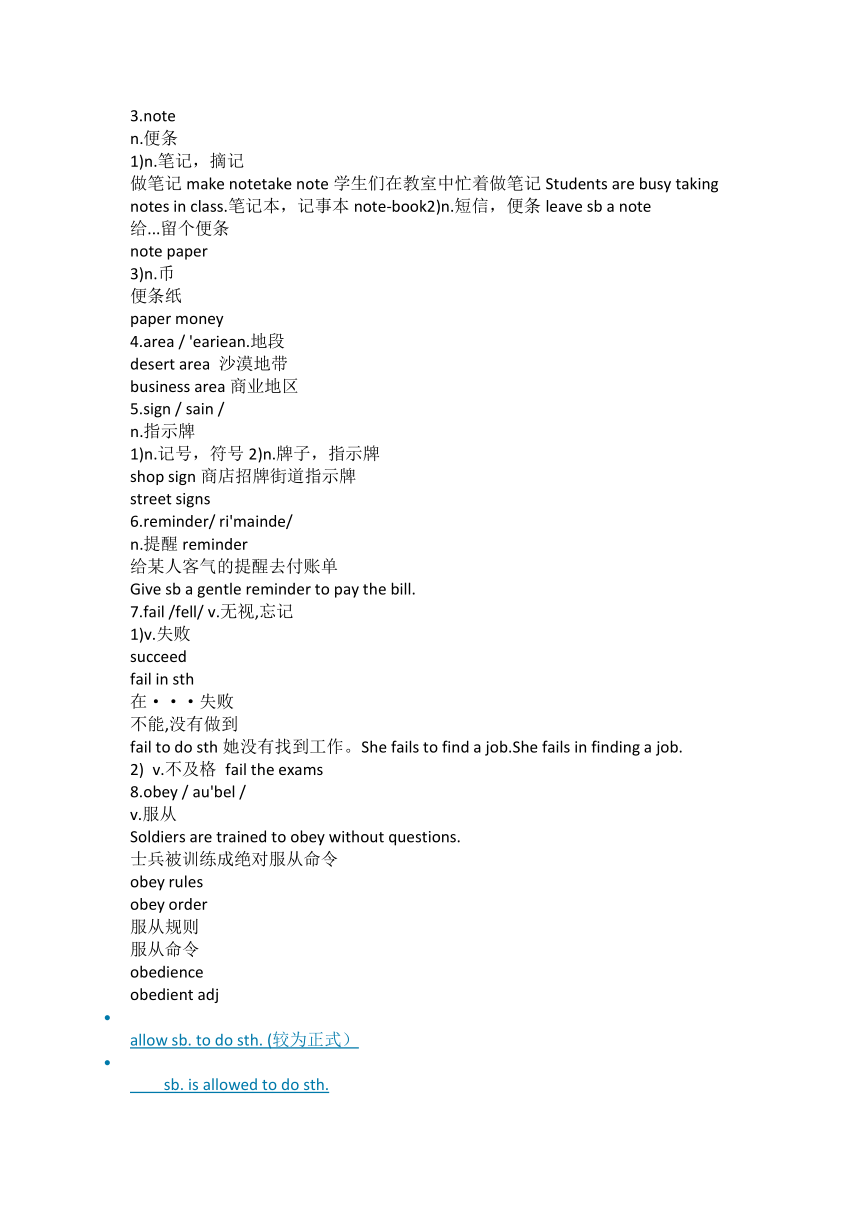新概念英语第二册 Lesson 16 A polite request 讲义
文档属性
| 名称 | 新概念英语第二册 Lesson 16 A polite request 讲义 |  | |
| 格式 | docx | ||
| 文件大小 | 23.2KB | ||
| 资源类型 | 教案 | ||
| 版本资源 | 新概念英语 | ||
| 科目 | 英语 | ||
| 更新时间 | 2023-09-26 16:56:18 | ||
图片预览


文档简介
Lesson 16 A polite request
Part 1: Text
Discussion
1. Have you ever noticed the traffic signs in streets
2. Can you guess the meanings of the signs below
Text:
If you park your car in the wrong place, a traffic policeman will soon find it. You will be very lucky if he let's you go without a ticket. However, this does not always happen. Traffic police are sometimes very polite. During a holiday in Sweden, I found this note on my car: ‘sir, we welcome you to out city. This is a “No Parking” area. You will enjoy your stay here if you pay attention to our street signs. This note is only a reminder.’ If you receive a request like this, you cannot fail to obey it!
Part 2: New words and expressions
1 park [pɑ:k] v.停放(汽车)
2 traffic ['tr fik] n.交通
3 ticket ['tikit] n.交通法规罚款单
4 note [n ut] n.便条
5 area ['e ri ] n.地点
6 sign [sain] n.指示牌
7 reminder [ri'maind ] n.指示
8 fail [feil] v.无视,忘记
9 obey [ 'bei] v.服从
1.park / pa:k /
v停放(汽车)
1)n.公园 the Central Park 中央公园
2)停放;停放车辆
park oneself你不能把车停在这条街上。You can't park in this street.
2.traffic
heavy traffic
light traffic
a traffic accident
n.交通
往来车辆很多
往来车辆不多
交通事故
ticket n.交通违规罚款单1)n.票(机票、车票、电影票等)
你想要张单程票还是双程票
Do you want a single or a return ticket
3.note
n.便条
1)n.笔记,摘记
做笔记make notetake note学生们在教室中忙着做笔记Students are busy taking notes in class.笔记本,记事本note-book2)n.短信,便条leave sb a note
给...留个便条
note paper
3)n.币
便条纸
paper money
4.area / 'eariean.地段
desert area 沙漠地带
business area商业地区
5.sign / sain /
n.指示牌
1)n.记号,符号2)n.牌子,指示牌
shop sign商店招牌街道指示牌
street signs
6.reminder/ ri'mainde/
n.提醒reminder
给某人客气的提醒去付账单
Give sb a gentle reminder to pay the bill.
7.fail /fell/ v.无视,忘记
1)v.失败
succeed
fail in sth
在···失败
不能,没有做到
fail to do sth她没有找到工作。She fails to find a job.She fails in finding a job.
v.不及格 fail the exams
8.obey / au'bel /
v.服从
Soldiers are trained to obey without questions.
士兵被训练成绝对服从命令
obey rules
obey order
服从规则
服从命令
obedience
obedient adj
allow sb. to do sth. (较为正式)
sb. is allowed to do sth.
let sb. do sth. (通常不用于被动语态)
我们不允许大家在教室里吸烟。
We don’t allow people to smoke in the classroom.
我会让你用我的字典的。
I will let you use my dictionary.
Part 3: Notes on the text
1. If you park your car in the wrong place, a trafficpoliceman will soon find it.
if引导的条件句
wrong adj.不合适的,错误的在合适的时间做不合适的事。
Do the wrong things in the right time.
traffic policeman交警
2. During a holiday in Sweden, I found this note on mycar: 'sir, we welcome you to our city. This is a "NoParking"area.
on my car
指车的外面
welcome you to our city
in the car
欢迎某人来某地
北京欢迎你
Welcome you to Beijing
3. You will enjoy your stay here if you pay attention to our street signs. This note is only a reminder.
You will enjoy your stay here.You'll have a good time here.
注意pay attention to请注意黑板。Please pay attention to the blackboard.
4. If you receive a request like this, you can not fail to obey it!
cannot fail to do sth.
一定能做某事
cannot fail to obey it
= you are certain to obey it.
Part 4: Grammar
if引导的条件句
条件状语从句通常由连词if引导, 意为 “如果; 假如; 倘若”, 表示在某种条件下, 很可能会发生某种事情或不发生某种事情。
1
if条件状语从句的位置
在if引导的条件状语从句中, if条件句位置比较灵活,可放在主句前面也可放在主句后面。若放在主句前, 从句后面要用逗号和主句隔开。如:If he doesn't feel tired, he will visit the museum. = He will visit the museum if he doesn't feel tired. 如果他不感觉累, 他就去参观博物馆。
2
if条件状语从句的时态搭配
(1) 当主句用一般将来时, if引导的条件状语从句要用一般现在时。如:If it rains tomorrow, I won' t climb the hills. 如果明天下雨, 我就不爬山。(2) 当主句中含有can, may, must等情态动词时, if引导的条件状语从句要用一般现在时。如:
We can win the basketball game if he joins us. 如果他加入我们, 我们就能贏这场篮球赛。(3) 当主句是祈使句时, 引导的条件状语从句要用一般现在时。如:Help your mom with the housework if you finish your homework early. 如果你完成作业早, 就帮你妈妈做家务。
3
与其他句式之间的转换
(1) 借助“祈使句+and / or+ 一般将来时的句子”这一句型来转换。and在句意上表示顺承关系, or表示转折关系。如:If you get up early, you'll get there on time. = Get up early, and you'll get there on time. = Get up early, or you won't get there on time. 早点起床, 你就会准时到那里。(2) 借助介词without或with来转换条件状语从句。如:If there is no water, fish will die. = Fish will die without water.如果没有水, 鱼就会死。If you help me, I'll finish the work soon. = With your help, I'll finish the work soon. 如果你帮助我, 我就会快点完成工作。(3) if … not 导的条件状语从句, 可以借助连词unless来改写。如You will be late if you don't go there by bus. = You will be late unless you go there by bus. 如果你不乘公共汽车你就会迟到。
4
If “如果, 假如” 它引导的句子表示某事发生所需的条件,即“在…条件下,某事才能发生”,在句子中充当状语,因此称之为条件状语从句.
条件句中,将来时用现在是表示,即:主将从现
Exercise
1.I’m sure if he _____(go) to the party, he________ (have) a great time.
2.If the rain _______(stop) tonight, we will go to the cinema.
3.I’ll buy a computer if I ______(have) enough money.
4.You _________(not get) nervous if you _____(do ) enough exercise.
5.If she ____ (be) kind to me , I __________(not argue) with her.
6.I want to know if he _________(come) tomorrow, if he _______(come), I __________(give) the massage to him.
7.If you _____(pay) more attention to that, he _________ (not get) injured.
Keys:goes,will have;stops;have;won't get,do;is,won't argue;will come,comes,will give;pay,won't get.
Part 5: Homework
1.背诵lesson 16单词&课文
2.Retell the story
3.完成Lesson 16配套练习
Part 1: Text
Discussion
1. Have you ever noticed the traffic signs in streets
2. Can you guess the meanings of the signs below
Text:
If you park your car in the wrong place, a traffic policeman will soon find it. You will be very lucky if he let's you go without a ticket. However, this does not always happen. Traffic police are sometimes very polite. During a holiday in Sweden, I found this note on my car: ‘sir, we welcome you to out city. This is a “No Parking” area. You will enjoy your stay here if you pay attention to our street signs. This note is only a reminder.’ If you receive a request like this, you cannot fail to obey it!
Part 2: New words and expressions
1 park [pɑ:k] v.停放(汽车)
2 traffic ['tr fik] n.交通
3 ticket ['tikit] n.交通法规罚款单
4 note [n ut] n.便条
5 area ['e ri ] n.地点
6 sign [sain] n.指示牌
7 reminder [ri'maind ] n.指示
8 fail [feil] v.无视,忘记
9 obey [ 'bei] v.服从
1.park / pa:k /
v停放(汽车)
1)n.公园 the Central Park 中央公园
2)停放;停放车辆
park oneself你不能把车停在这条街上。You can't park in this street.
2.traffic
heavy traffic
light traffic
a traffic accident
n.交通
往来车辆很多
往来车辆不多
交通事故
ticket n.交通违规罚款单1)n.票(机票、车票、电影票等)
你想要张单程票还是双程票
Do you want a single or a return ticket
3.note
n.便条
1)n.笔记,摘记
做笔记make notetake note学生们在教室中忙着做笔记Students are busy taking notes in class.笔记本,记事本note-book2)n.短信,便条leave sb a note
给...留个便条
note paper
3)n.币
便条纸
paper money
4.area / 'eariean.地段
desert area 沙漠地带
business area商业地区
5.sign / sain /
n.指示牌
1)n.记号,符号2)n.牌子,指示牌
shop sign商店招牌街道指示牌
street signs
6.reminder/ ri'mainde/
n.提醒reminder
给某人客气的提醒去付账单
Give sb a gentle reminder to pay the bill.
7.fail /fell/ v.无视,忘记
1)v.失败
succeed
fail in sth
在···失败
不能,没有做到
fail to do sth她没有找到工作。She fails to find a job.She fails in finding a job.
v.不及格 fail the exams
8.obey / au'bel /
v.服从
Soldiers are trained to obey without questions.
士兵被训练成绝对服从命令
obey rules
obey order
服从规则
服从命令
obedience
obedient adj
allow sb. to do sth. (较为正式)
sb. is allowed to do sth.
let sb. do sth. (通常不用于被动语态)
我们不允许大家在教室里吸烟。
We don’t allow people to smoke in the classroom.
我会让你用我的字典的。
I will let you use my dictionary.
Part 3: Notes on the text
1. If you park your car in the wrong place, a trafficpoliceman will soon find it.
if引导的条件句
wrong adj.不合适的,错误的在合适的时间做不合适的事。
Do the wrong things in the right time.
traffic policeman交警
2. During a holiday in Sweden, I found this note on mycar: 'sir, we welcome you to our city. This is a "NoParking"area.
on my car
指车的外面
welcome you to our city
in the car
欢迎某人来某地
北京欢迎你
Welcome you to Beijing
3. You will enjoy your stay here if you pay attention to our street signs. This note is only a reminder.
You will enjoy your stay here.You'll have a good time here.
注意pay attention to请注意黑板。Please pay attention to the blackboard.
4. If you receive a request like this, you can not fail to obey it!
cannot fail to do sth.
一定能做某事
cannot fail to obey it
= you are certain to obey it.
Part 4: Grammar
if引导的条件句
条件状语从句通常由连词if引导, 意为 “如果; 假如; 倘若”, 表示在某种条件下, 很可能会发生某种事情或不发生某种事情。
1
if条件状语从句的位置
在if引导的条件状语从句中, if条件句位置比较灵活,可放在主句前面也可放在主句后面。若放在主句前, 从句后面要用逗号和主句隔开。如:If he doesn't feel tired, he will visit the museum. = He will visit the museum if he doesn't feel tired. 如果他不感觉累, 他就去参观博物馆。
2
if条件状语从句的时态搭配
(1) 当主句用一般将来时, if引导的条件状语从句要用一般现在时。如:If it rains tomorrow, I won' t climb the hills. 如果明天下雨, 我就不爬山。(2) 当主句中含有can, may, must等情态动词时, if引导的条件状语从句要用一般现在时。如:
We can win the basketball game if he joins us. 如果他加入我们, 我们就能贏这场篮球赛。(3) 当主句是祈使句时, 引导的条件状语从句要用一般现在时。如:Help your mom with the housework if you finish your homework early. 如果你完成作业早, 就帮你妈妈做家务。
3
与其他句式之间的转换
(1) 借助“祈使句+and / or+ 一般将来时的句子”这一句型来转换。and在句意上表示顺承关系, or表示转折关系。如:If you get up early, you'll get there on time. = Get up early, and you'll get there on time. = Get up early, or you won't get there on time. 早点起床, 你就会准时到那里。(2) 借助介词without或with来转换条件状语从句。如:If there is no water, fish will die. = Fish will die without water.如果没有水, 鱼就会死。If you help me, I'll finish the work soon. = With your help, I'll finish the work soon. 如果你帮助我, 我就会快点完成工作。(3) if … not 导的条件状语从句, 可以借助连词unless来改写。如You will be late if you don't go there by bus. = You will be late unless you go there by bus. 如果你不乘公共汽车你就会迟到。
4
If “如果, 假如” 它引导的句子表示某事发生所需的条件,即“在…条件下,某事才能发生”,在句子中充当状语,因此称之为条件状语从句.
条件句中,将来时用现在是表示,即:主将从现
Exercise
1.I’m sure if he _____(go) to the party, he________ (have) a great time.
2.If the rain _______(stop) tonight, we will go to the cinema.
3.I’ll buy a computer if I ______(have) enough money.
4.You _________(not get) nervous if you _____(do ) enough exercise.
5.If she ____ (be) kind to me , I __________(not argue) with her.
6.I want to know if he _________(come) tomorrow, if he _______(come), I __________(give) the massage to him.
7.If you _____(pay) more attention to that, he _________ (not get) injured.
Keys:goes,will have;stops;have;won't get,do;is,won't argue;will come,comes,will give;pay,won't get.
Part 5: Homework
1.背诵lesson 16单词&课文
2.Retell the story
3.完成Lesson 16配套练习
同课章节目录
